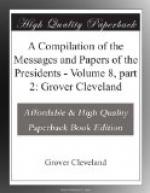My dear sir: I have read the partial report of the commission appointed to examine the New York custom-house. I concur with the commission in their recommendations. It is my wish that the collection of the revenues should be free from partisan control, and organized on a strictly business basis, with the same guaranties for efficiency and fidelity in the selection of the chief and subordinate officers that would be required by a prudent merchant. Party leaders should have no more influence in appointments than other equally respectable citizens. No assessments for political purposes on officers or subordinates should be allowed. No useless officer or employee should be retained. No officer should be required or permitted to take part in the management of political organizations, caucuses, conventions, or election campaigns. Their right to vote and to express their views on public questions, either orally or through the press, is not denied, provided it does not interfere with the discharge of their official duties.
Respectfully,
R.B. Hayes.
Executive Mansion, Washington, June 22, 1877,
Sir:[2] I desire to call your attention to the following paragraph in a letter addressed by me to the Secretary of the Treasury on the conduct to be observed by officers of the General Government in relation to the elections:
No officer should be required or permitted to take part in the management of political organizations, caucuses, conventions, or election campaigns. Their right to vote and to express their views on public questions, either orally or through the press, is not denied, provided it does not interfere with the discharge of their official duties. No assessment for political purposes on officers or subordinates should be allowed.
This rule is applicable to every department of the civil service. It should be understood by every officer of the General Government that he is expected to conform his conduct to its requirements.
Very respectfully,
R.B. Hayes.
[Footnote 2: Addressed to Federal officers generally.]
Executive Mansion, August 7, 1877.
By virtue of authority conferred upon the President
of the United
States by the provisions of section 2132, Revised
Statutes of the
United States, as follows:
The President is authorized, whenever in his opinion the public interest may require the same, to prohibit the introduction of goods, or of any particular article, into the country belonging to any Indian tribe, and to direct all licenses to trade with such tribe to be revoked and all applications therefor to be rejected. No trader to any other tribe shall, so long as such prohibition may continue, trade with any Indians of or for the tribe against which such prohibition is issued—




